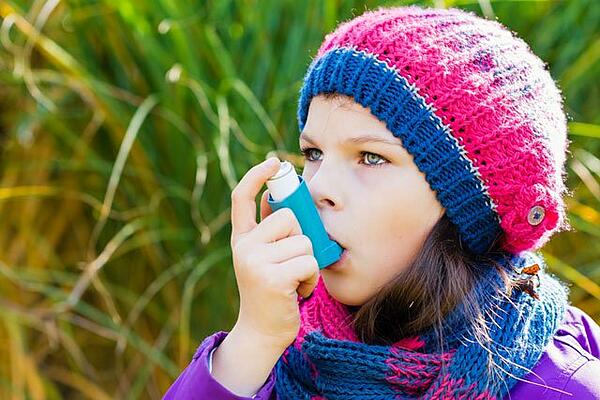Establishing the diagnosis of asthma in very young children can be difficult, because early childhood coughing/wheezing can be due to smaller than average bronchial tubes, which resolves spontaneously as the child grows older and the bronchial tubes become larger. One consideration is that asthma can run in families.
What are the Common Symptoms of Asthma?
- Wheezing or noisy breathing
- Coughing, often at night or early in the morning, or when you exercise
- A tight feeling in the chest
- Difficulty breathing
The frequency of asthma symptoms can vary and they can range from mild to severe. Symptoms can happen daily, weekly, or less often
Is There a Test for Asthma?
Yes, a breathing test that measures a child’s lung function can be helpful to establish the diagnosis of asthma and monitor its control. Most children 6 years and older can perform this test. The asthma breathing test may be normal in children with asthma if they have no symptoms when the test is performed. For children younger than 6, the diagnosis is based on the group of symptoms, an examination of the lungs and response to asthma medication.
Allergy testing may also provide useful information when trying to establish an asthma diagnosis, since allergies are a common cause or trigger for childhood asthma.
How Will the Doctor Evaluate My Child for Possible Asthma?
Your doctor will also do a physical exam and ask questions such as:
- What symptoms does your child have?
- How often does he or she have the symptoms?
- Do the symptoms wake him or her up at night?
- Do the symptoms keep your child from playing or going to school?
- Do certain things make symptoms worse, like having a cold or exercising?
- Do certain things make symptoms better, like medicine or resting?
How Do You Treat Childhood Asthma?
The ideal treatment for asthma is to prevent the onset of symptoms by avoiding asthma triggers such as allergies and respiratory infections, which are the two most common triggers for childhood asthma. There are many medications available to treat asthma. Asthma medicines work in 1 of 2 ways:
- Quick-relief medicines – Stop symptoms quickly. Common examples include albuterol or Xopenex (levalbuterol). These medicines should only be needed once in a while. If your child needs these medicines more than twice a week on a regular basis, tell his or her doctor. You should also call your child’s doctor if this medicine is used for an asthma attack and symptoms come back quickly, or do not get better.
- Long-term controller medicines – Control asthma and prevent future symptoms. If your child has frequent symptoms or several severe episodes in a year, he or she might need to take these each day. The most commonly utilized controller medications are low dose inhaled corticosteroids such as Pulmicort, Flovent , Qvar etc. or leukotriene antagonists such as montelukast (Singulair).
Almost all young children with asthma use an inhaler with a device called a “spacer.” The spacer device makes inhaling the asthma medication more effective. Some children also need a machine called a “nebulizer” to breathe in their medicine. A doctor or nurse will show you the right way to use these.
It is very important that you give your child all the medicines the doctor prescribes. You might worry about giving a child a lot of medicine. But leaving your child’s asthma untreated has much bigger risks than any risks the medicines might have.
If you have more questions or concerns about asthma and your child and the various triggers of asthma (pollen, cigarette smoke, pets, dust mites, mold, exercise) contact the asthma specialists at Advanced Specialty Care. We have offices in the Fairfield County, CT towns of Danbury, New Milford, Norwalk and Ridgefield.

